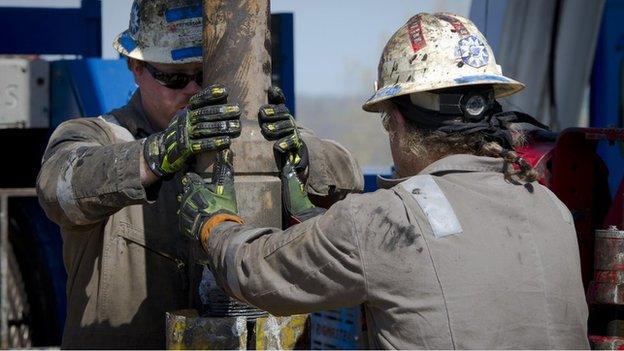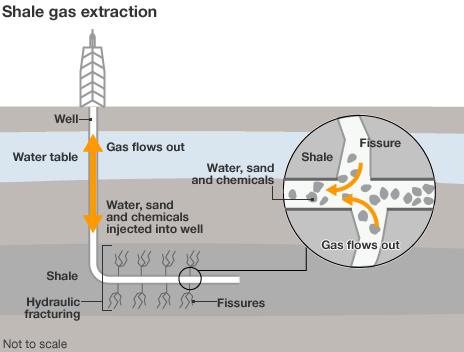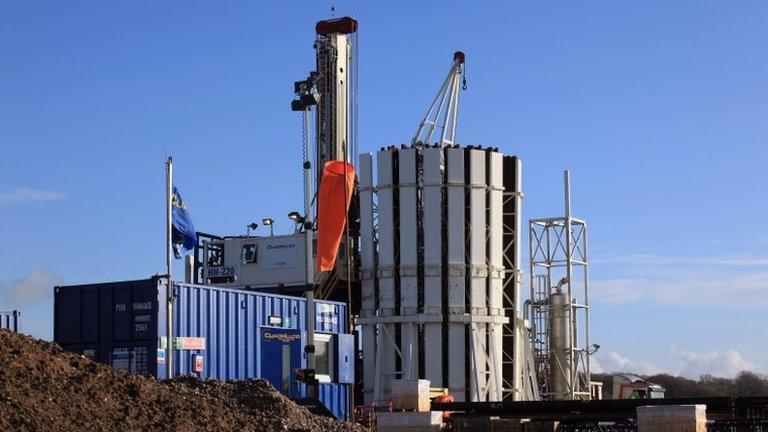Scottish devolution: Extra powers 'must cover fracking'
- Published

The Scottish government has called for devolved powers on fracking after the UK decided to press ahead with plans to let companies drill below people's land without permission.
Oil and gas drilling in Scotland was a matter for its own people, said energy minister Fergus Ewing.
Whitehall wants to give firms the right to drill at depths of 300m (984ft) under private land without consent.
This is despite opposition to the proposals in a government consultation.
A UK government spokesman said: "The Scottish Government statement ignores the fact most of the powers needed to make Scottish decisions on this matter are already devolved to Holyrood."
The spokesman claimed local communities in Scotland had full powers to decide whether to approve or decline any proposed shale or geothermal developments.
However, Scotland's energy minister said: "UK government proposals to remove the right of Scottish householders to object to drilling under their homes, without so much as debate in the Scottish Parliament, flies in the face of Scotland's cautious, considered and evidence-based approach on this issue."

There were 'both opportunities and concerns' on the issue, said Mr Ewing
"It is also fundamentally an issue affecting land ownership rights.
"Whatever your view on the issue of unconventional oil and gas - and it is clear that there are both opportunities and concerns - there is only one way that the people of Scotland can determine the approach in Scotland - including beneath their homes and land.
"That is with the devolution of the necessary powers to Scotland and the current devolution process for the extensive new powers promised in the vow should include these powers."
Hydraulic fracturing or fracking involves pumping water, chemicals and sand at high pressure underground to fracture shale rock and release the gas trapped in it. Wells can be drilled horizontally, leading to exploration under land around a drilling site.
No change in proposals
The Department for Energy and Climate Change (DECC) ran a consultation from May 23 to August 15 asking respondents whether the government should legislate for underground access to gas, oil and geothermal developers below 300m.
Of the 40,647 people who responded, more than 99% opposed the idea.
The government responded by saying: "We acknowledge the large number of responses against the proposal and the fact that the proposal has provided an opportunity for the public to voice their concerns and raise issues.

"However, the role of the consultation was to seek arguments and evidence to consider in developing the proposed policy. Whilst a wide range of arguments were raised and points covered, we did not identify any issues that persuaded us to change the basic form of the proposals.
"Having carefully considered the consultation responses, we believe that the proposed policy remains the right approach to underground access and that no issues have been identified that would mean that our overall policy approach is not the best available solution.
"We will therefore put before parliament primary legislation to implement the policy proposals set out in the consultation paper. Parliament's scrutiny of the provisions will provide further opportunities for public engagement on the issues."
'Absolutely outrageous'
The consultation stated that under the present system a single landowner had the power to significantly delay a development "even though the drilling and use of underground wells does not affect their enjoyment of their land".
"We intend to change this system by making it less burdensome for companies to gain underground access rights," said the DECC.
Companies looking to develop shale gas and oil would still need to obtain all the necessary environmental and planning permissions but the proposed legislation would effectively remove the issue of trespass at depths of 300m or more.
Under the proposals, people living on the ground above a horizontal well extending more than 200m would receive a payment of £20,000.
Mary Church, head of campaigns at Friends Of The Earth Scotland, said: "It is absolutely outrageous that the UK government has ignored over 99% of responses to this consultation, and the stated objection of the Scottish government, that the removal of people's rights to object to fracking underneath their homes is simply unacceptable."
A UK government spokesman said: "It is simply misleading to claim that householders will lose their say.
"The Scottish Parliament already has all the necessary powers to decide on application of this approach in Scotland, as planning policy is devolved to the Parliament and is unaffected by these proposals.
"All decisions on whether or not to grant planning and permitting consent for shale development in Scotland remain with local authorities, the Scottish environmental regulator SEPA, and ultimately with the Scottish Government.
"This means that local communities in Scotland will still have full powers to decide whether to approve or decline any proposed shale or geothermal developments in Scotland."
- Published15 August 2014

- Published27 January 2014

- Published4 September 2014
